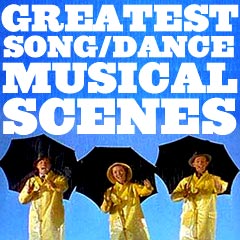
|
|
| H | ||

|
Hair (1979)
Czech director Milos Forman's and UA's invigorating and audacious film version of the 1968 rock musical play, with dancer Twyla Tharp's choreography, included many memorable song-and-dance tunes (and boldly stark nudity) among the Central Park hippies, such as:
|
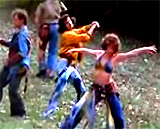 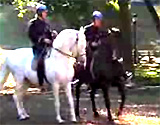  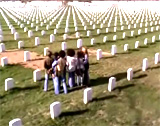
|
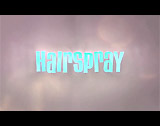
|
Hairspray (2007) This successful song-and-dance adaptation of the Tony award-winning 2002 Broadway smash hit was also based on John Waters' 1988 cult classic film. It became one of the few movie musicals that grossed over $100 million (it was the third highest grossing musical film in U.S. cinema history at the time). Set in early 1960s Baltimore, it told about how plump teenager Tracy Turnblad (newcomer Nikki Blonsky) - who had an equally corpulent laundress mother Edna Turnblad (John Travolta in drag) - successfully competed in a local teen dance TV show and also brought about racial integration. Although it was not nominated for a single Academy Award, it had three Golden Globe nominations (Best Motion Picture Musical, Best Actress Musical - Blonsky, and Best Supporting Actor - Travolta). The final showstopping song at the "Miss Teenage Hairspray" pageant was You Can't Stop the Beat (pictured twice), sung and danced by Tracy, Motormouth Maybelle (Queen Latifah), and others. |
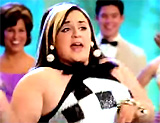 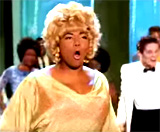
|
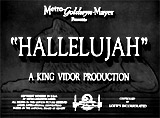
|
Hallelujah (1929) An early MGM talkie directed by Academy Award-nominated King Vidor was daring because it was the first sound feature film from a major studio with an all-black cast. Noted as the first all-black musical, it was produced as a silent film and then supplemented with a dubbed-in soundtrack during post-production in Hollywood. It was considered slightly overwrought, patronizing and flawed (Vidor's only musical after it failed at the box-office). It was criticized as having stereotypical racist overtones (its trailer advertised "Famous All-Colored Artists"), a slow pace, and some embarrassing dialogue. The memorable film - a story of murder, corruption and redemption in the Deep South, was filmed mostly on location in Memphis, Tennessee and Arkansas in plantation settings. It featured the story of a black sharecropper/preacher Zeke (Daniel L. Haynes) who was treacherously seduced by Chick (Nina Mae McKinney). The musical was filled with jazz numbers, spirituals, traditional folk songs, work songs and lullabies, including:
|
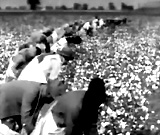 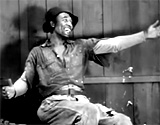 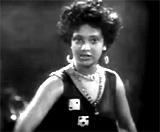
|
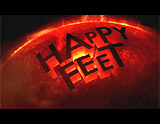
|
Happy Feet (2006) The many song-and-dance numbers in this CGI-animated tale included the opening courting duet songs between two Emperor Penguins in Antarctica:
It told about the birth of their young penguin chick Mambo (nicknamed "Mumble") (voice of Elijah Wood) - a young fuzzball without the gift of song but who had a unique talent as a tap dancer (noted dancer Savion Glover motion-captured to supply the dancing movements). The memorable scenes included:
|
 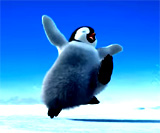 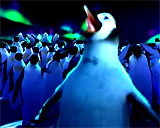 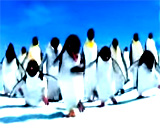  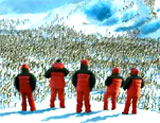
|
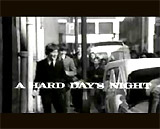
|
A Hard Day's Night (1964, UK) The many famous Beatles songs (performed by John Lennon, Paul McCartney, George Harrison, and Ringo Starr) were interwoven into this semi-documentary comedy story of 36 years in the life of the rock group by director Richard Lester, including:
The film also included the memorable moment when the group romped through an open grassy field like children to the tune of Can't Buy Me Love (pictured) - filmed with creative camera angles. |
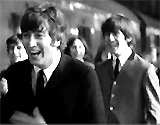 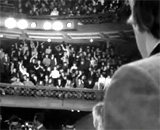 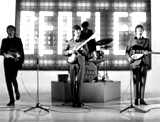 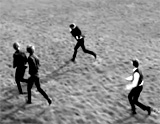
|
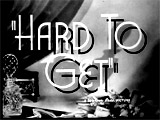
|
Hard to Get (1938) This Warners Brothers' romantic comedy was about a developing romance between unemployed and struggling Bill Davis (Dick Powell) and spoiled heiress Margaret Richards (Olivia de Havilland). He sang a famous rendition of the Oscar-winning hit song You Must Have Been a Beautiful Baby (pictured twice) during a night-time rowboat ride -- with music and lyrics by Harry Warren and Johnny Mercer. |
 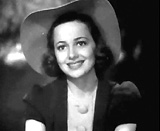
|
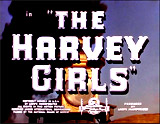
|
The Harvey Girls (1946)
This entertaining MGM film, directed by George Sidney and produced by Arthur Freed, included a score by Harry Warren and Johnny Mercer. It had two Academy Award nominations, for Best Musical Score and Best Song, and won the latter. The title referred to the straight-laced waitresses of the pioneering restaurant chain founded by Fred Harvey, who were brought Westward to fill the eating establishments and bring domesticity to the townsmen. It starred Judy Garland as mail-order bride Susan Bradley - the film opened with Garland on the back of a westward-bound train singing the very pretty ballad In the Valley (Where the Evenin' Sun Goes Down) (pictured). One of Garland's biggest hits was the film's best number, after arriving in the fictional Arizona town of Sandrock - the elaborate, show-stopping Oscar-winning Best Song: On the Atchison, Topeka and the Santa Fe (pictured twice). Other favorites were:
|
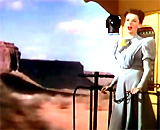 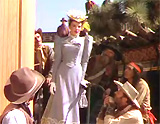 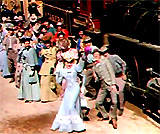  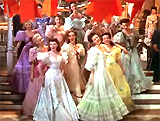
|
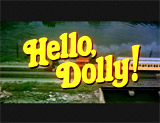
|
Hello, Dolly! (1969) After her success in Funny Girl (1968), Barbra Streisand starred in this ill-considered, cumbersome Fox film directed by dancer Gene Kelly -- it was a big-budget musical version of Thornton Wilder's play The Matchmaker that had opened on Broadway in 1964. The musical was the most expensive ($20 million) produced up to its time. Streisand starred as a miscast widowed Jewish matchmaker named Dolly Levi -- she sang the famous title song Hello, Dolly! (pictured twice) in the Harmonia Gardens sequence where she was joined by gravel-voiced bandleader and trumpeter Louis "Satchmo" Armstrong who sang:
The film also included Before the Parade Passes By (pictured twice), first solely with Streisand, and then staged with a large parade down a reconstructed 14th Street in 1890s NYC. |
 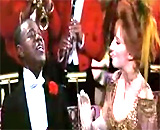 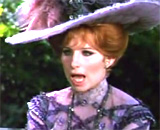 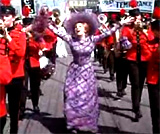
|
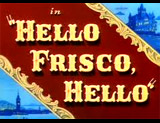
|
Hello, Frisco, Hello (1943)
There were ten songs nominated by the Academy for Best Original Song, one of which appeared in this lightweight, Technicolored 20th Century Fox musical feature, released during the height of WWII. Its Harry Warren-penned song You'll Never Know, with lyrics by Mack Gordon, was declared the winner. Although the film was a modified remake of King of Burlesque (1936), it was a high-grossing star vehicle for Fox's beautiful singing star Alice Faye, who was soon to be replaced by Betty Grable. You'll Never Know became Faye's signature song:
Faye also performed the song in Four Jills in a Jeep (1944). The setting of the film was San Francisco ("Frisco," aka the Barbary Coast), during the early part of the 20th Century, at the time of the Panama Pacific Exposition. The main plot was about struggling vaudeville performers involved in a love triangle of sorts, including:
The Best Original Song winner You'll Never Know (pictured), was performed by Faye and played throughout the picture. She also sang Hello, Frisco! (pictured) while talking on the newly-invented Bell telephone, Ragtime Cowboy Joe (pictured) - performed costumed in a cowgirl outfit while spinning a rope, and They Always Pick on Me (pictured). |
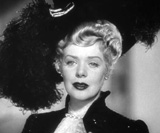 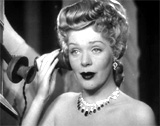 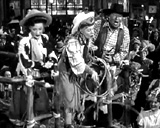 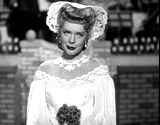
|
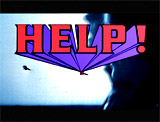
|
Help! (1965) In this Fab Four spoof of the James Bond films, the Beatles sang many classic, memorable tunes, including:
|
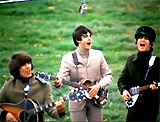 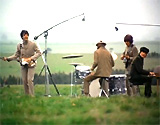 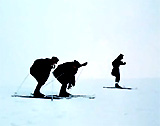  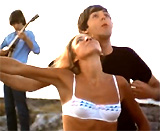
|

|
Hercules (1997) This Disney animation (their 35th) was the studio's first feature film inspired by Greek mythology. The opening narration was by the voice of Charlton Heston:
Then came one of many lively Greek Chorus gospel soul group do-wop songs including the opening credits expositionary song The Gospel Truth (pictured). Young Hercules (voice of Roger Bart) also sang the triumphant Oscar-nominated original song Go the Distance (pictured):
|
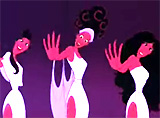 
|
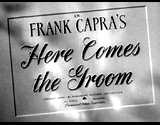
|
Here Comes the Groom (1951)
Paramount Pictures' and Frank Capra's little-known romantic comedy/musical had the honor of receiving two Academy Award nominations and winning Best Song In the Cool, Cool, Cool of the Evening (music by Hoagy Carmichael, and lyrics by Johnny Mercer). It was also nominated for Best Motion Picture Story (by Robert Riskin and Liam O'Brien). This was Capra's and Bing Crosby's second film together, after Riding High (1950). The plot was about the romantic efforts to win back love from a former fiancee (in order to legally adopt two war orphans within five days time, or they would be returned to France), with two main stars:
The main song/dance between the two stars was their duet performance of the hit song In the Cool, Cool, Cool of the Evening (pictured) in an office building:
|
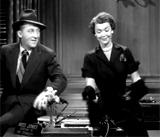
|
(alphabetical by film title) Introduction | A-1 | A-2 | B-1 | B-2 | B-3 | C-1 | C-2 | D-1 | D-2 | E | F-1 | F-2 | G-1 | G-2 H-1 | H-2 | I-J | K | L-1 | L-2 | M-1 | M-2 | N-O | P-1 | P-2 | R-1 | R-2 | S-1 | S-2 | S-3 | T | U-V | W | X-Z |